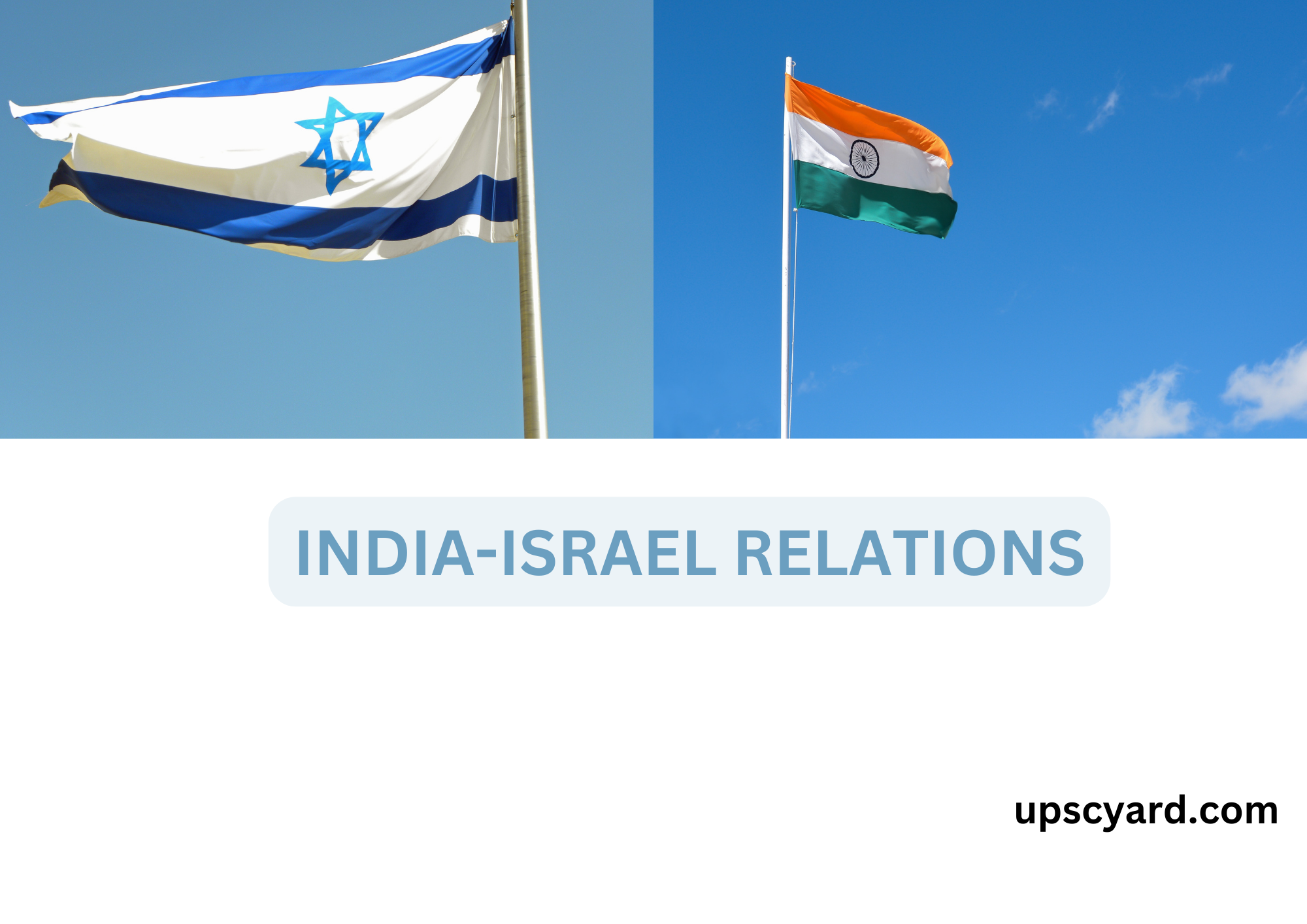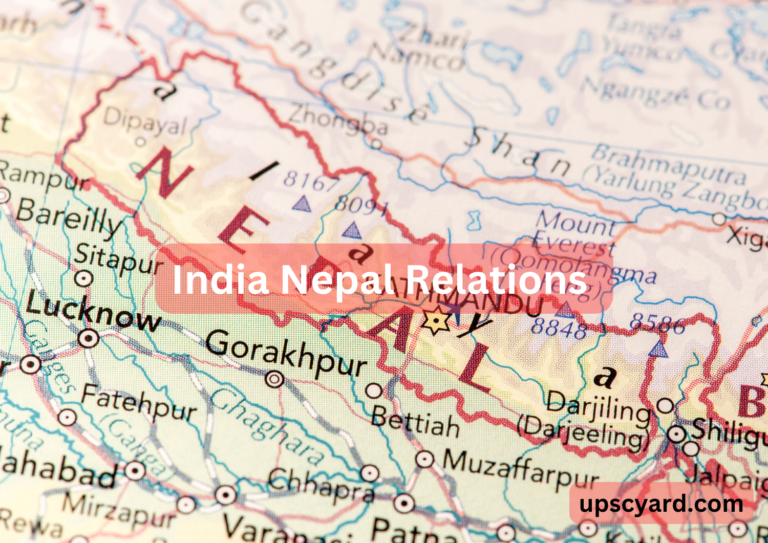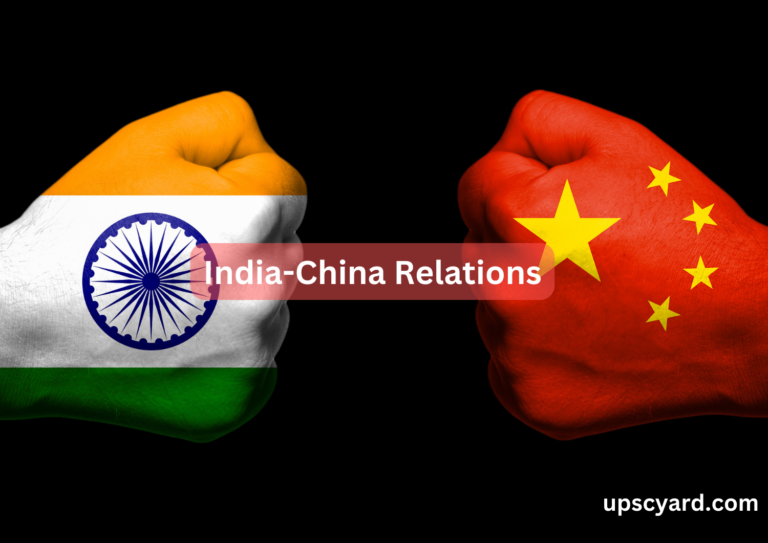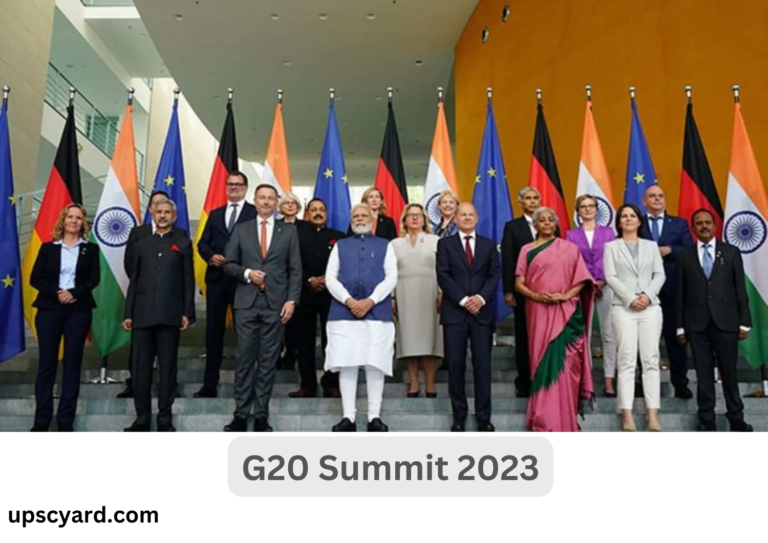The relationship between India and Israel is a blend of intrigue and inspiration. Despite possessing the necessary ingredients for a strong partnership from the outset, full diplomatic relations between the two nations were only established in 1992. It took an additional 25 years, until 2017, for the two countries to formalize a ‘Strategic Partnership.’
INDIA-ISRAEL RELATIONS
Today, India and Israel enjoy a close friendship and collaborate across various domains of development. This module aims to explore the factors that have brought these two nations together, the reasons for the time it took to forge a meaningful relationship, and the current state of their cooperation.
Rise and Evolution of Israel

Mahatma Gandhi was among the earliest global leaders to endorse the idea of a separate homeland for the Jewish people. This vision, supported by the Balfour Declaration, aimed to divide Palestinian territories to create this homeland.
However, it wasn’t until 1948, following the conclusion of World War II, that this vision became a reality. The state of Israel was officially established and immediately faced hostile attacks from its neighboring nations. Despite the challenges, Israel demonstrated remarkable resilience and successfully defended its territorial integrity. Over the years, Israel engaged in and triumphed in four wars.
Although India and Israel both gained independence from the United Kingdom around the same time, they embarked on different paths for nearly four decades. It wasn’t until 1992 that the two nations established full diplomatic relations, and it took an additional 25 years for them to elevate their relationship to a strategic partnership.
From the moment of its independence, India was committed to the Palestinian cause and played a leading role in the Non-Aligned Movement (NAM). In contrast, Israel aligned itself with the United States during the Cold War era.
The end of the Cold War and the disintegration of the Soviet Union in 1991 not only opened opportunities for stronger Indo-US relations but also paved the way for improved ties between the US and its allies, including Japan, ASEAN nations, and Israel.
In 2017, Indian Prime Minister Narendra Modi’s historic visit to Israel marked a significant turning point. During this visit, India and Israel not only upgraded their relations to a ‘Strategic Partnership’ but also signed seven crucial agreements spanning agriculture, science and technology, research and development, and space collaboration.
Israeli Prime Minister Benjamin Netanyahu reciprocated with a visit to India in 2018, during which agreements related to cybersecurity and film cooperation were also signed. These developments dispelled earlier notions and demonstrated the growing strength of the bilateral relationship between the two nations.
Historical Challenges in Bilateral Relations
- Influence of ‘Vote Bank’ Politics in India
One unfortunate aspect of Indian politics that hindered the realization of the full potential in India-Israel ties was the influence of “vote bank” politics. The ruling party in India was hesitant to fully cultivate relations with Israel out of fear of losing support from certain minority groups. This hesitance was based on an unfounded assumption that a particular community in India held negative sentiments towards Israel and its actions in Palestine. - Concerns About the Arab World
Another significant factor that restrained India from fully embracing Israel was the apprehension of facing backlash from the Arab world. India had established extensive ties with Arab nations, particularly concerning energy security and diaspora connections. This apprehension led to cautious diplomacy, which, in hindsight, appears to have been overly timid given the current state of affairs.
India and Israel: A Natural Alliance
Currently, India and Israel are deeply engaged in collaborative efforts, primarily in the fields of defense and agriculture. This robust partnership is often described as one between natural allies, and it is widely believed that this alliance is here to stay.
It might seem intriguing to contemplate what common ground exists between the world’s seventh-largest nation, both in terms of geographical territory and population, and a nation situated along the Mediterranean coastline.
So, what factors contribute to the existing partnership and its promising future, making it akin to a natural alliance?
A) Historical, Cultural, and Geographical Affinities
India and Israel share a wealth of historical, cultural, and geographical similarities that underpin their close alliance:
1. Ancient Civilizations: Both nations have deep roots in ancient civilizations influenced by Christianity, Judaism, and Islam. Over time, they have had significant interactions with each other.
2. Safe Haven for Jews: India served as a safe haven for Jews during times of persecution in Europe and other regions. In India, they found refuge, security, and prosperity. India remains a popular destination for Israeli youth.
3. Geographical Parallels: India and Israel face common challenges related to water security. They share similar geographical features, such as the Negev Desert in Israel and the Thar Desert in India. Both countries have arid regions, including Bundelkhand, Deccan Trap areas, North Karnataka, and Tamil Nadu. This necessitates cooperation in food and water security.
4. Water Resources: The availability and quality of water significantly impact agricultural productivity in both nations. This shared concern calls for collaborative efforts in managing water resources.
B) Intellectual Synergies
India and Israel boast intellectual similarities that contribute to their alliance:
1. IT and Knowledge Services: India is a global hub for IT services and knowledge-based industries. Its expertise extends to various knowledge sector tasks and innovations.
2. Manufacturing and Space Technology: In recent years, India has witnessed growth in manufacturing, particularly in pharmaceuticals and the automobile sector. It is also making strides in space technology, with the development of cryogenic technology, enabling cost-effective satellite launches.
3. Israeli Innovation: Israel is renowned as a global leader in innovation. It boasts some of the world’s most successful scientists and products. The nation’s thriving start-up ecosystem has produced cutting-edge technologies. Both countries have opportunities to learn from each other in the realm of innovation.
C) Geo-Political Affinities
India and Israel face geo-political challenges and threats that have forged a bond between them:
1. Hostile Neighbors: Both nations contend with hostile neighbors. While Israel has successfully established diplomatic relations and peace agreements with some of its neighbors, it grapples with persistent security threats, particularly terrorism.
2. Terrorism: India has its share of terrorism, notably state-sponsored cross-border terrorism emanating from Pakistan. Counter-terrorism efforts and intelligence sharing constitute a crucial aspect of the partnership between India and Israel.
Foundations of Collaboration
A) Defence and Strategic Relations
India and Israel have forged a robust partnership built on several pillars of cooperation, with defense and strategic relations serving as a cornerstone:
1. Defense and Strategic Ties: Defense collaboration is a key driver of India-Israel relations. Israel, faced with ongoing regional hostilities, has become a global leader in defense technology. Israel has consistently supported India in matters of defense and national security. During the Kargil war, Israel provided precision-guided bombs that played a pivotal role in evicting Pakistani forces from occupied territories. This partnership has evolved beyond a buyer-seller relationship, encompassing joint production and innovation in defense technology.
2. Defense Trade: As of 2016, defense trade between the two nations stood at USD 600 million, making Israel the third-largest supplier of defense hardware to India, following Russia and the United States. India has acquired various Israeli weapons systems, including Unmanned Aerial Vehicles (UAVs) such as the Searcher, Heron, and Hermes 900. Additionally, India has procured advanced weaponry like the Barak 8 Surface-to-Air Missile and Spike anti-tank missiles. Collaborative efforts are underway to integrate the Search Track and Guidance Radar into Indian naval vessels, such as INS Kolkata and INS Shivalik.
3. FDI in Defense: India’s recent liberalization of Foreign Direct Investment (FDI) rules in the defense sector, allowing up to 74% FDI, presents opportunities for Israeli companies to deepen their engagement in India’s defense market and invest in the country.
4. Counterterrorism and Intelligence Sharing: India and Israel face common threats from Islamic terrorist groups, including Al Qaeda and the Islamic State (IS). Both nations have witnessed cross-border terrorism, with Hamas in Gaza posing a threat to Israel and Pakistan sponsoring terrorism against India. Given these shared challenges, India has much to gain from Israeli security expertise, including the insights of Mossad, Israel’s intelligence agency. Both countries have established Joint Working Groups on counterterrorism and intelligence sharing to enhance their collaborative efforts in tackling these threats.
5. Border Management and Cybercrimes: To address specific challenges, four Working Groups focus on border management, internal security, police modernization, capacity building, and cybercrimes. These groups facilitate cooperation and information exchange in crucial areas.
6. Abrahamic Accords: The recently signed Abrahamic Accords between Israel, the UAE, and Bahrain, mediated by the USA, present opportunities for India and Israel to further strengthen their relationship. India had been cautious about engaging with Israel due to concerns about potential repercussions in the Arab world, which is vital for India’s energy security and diaspora interests.
In summary, defense and strategic relations are fundamental pillars of the collaboration between India and Israel. Their partnership, rooted in shared security concerns, has evolved into a multifaceted cooperation spanning defense trade, technology innovation, counterterrorism, and intelligence sharing. This relationship continues to thrive, offering opportunities for growth and mutual benefit.
B) Collaboration in Agriculture
Agricultural cooperation stands as a crucial facet of India-Israel relations, benefiting both nations in addressing their respective agricultural challenges:
1. Israel’s Arid Geography: Israel grapples with a challenging geographical landscape, with a significant portion of its territory comprising deserts and coastal regions. This makes traditional agricultural practices difficult, raising concerns about food security.
2. Israeli Agricultural Innovations: Israel has taken on this challenge with unwavering determination, consistently pioneering advancements in agricultural technologies. The country has garnered international recognition for its leadership in water conservation, drought-resistant seeds, genetically modified (GM) crops, and innovative irrigation methods, such as drip irrigation.
3. Knowledge Exchange: India has much to gain from Israel’s agricultural expertise. To facilitate this knowledge transfer, the two nations have established various agreements. Israel has set up over 25 India-Israel Centers of Excellence for Cooperation in Agriculture across several Indian states. Furthermore, India imports significant quantities of potash, a crucial agricultural fertilizer, from Israel.
4. Technology Transfer: India has benefited substantially from Israeli practices in areas including micro-irrigation, post-harvest technology, horticulture, agricultural mechanization, nursery management, dairy farming, orchard farming, and drip irrigation. These technologies help enhance agricultural productivity and resource efficiency.
5. Climate Change Resilience: With climate change posing a growing threat to global agriculture, India, in particular, faces significant challenges due to its heavy reliance on the monsoon season. The irregularities in monsoon patterns can wreak havoc on the Indian economy. Collaborating with Israel in the field of agriculture becomes imperative to mitigate the adverse impacts of climate change.
C) Advancements in Science and Technology Collaboration
The realm of Science and Technology stands at the forefront of global progress, shaping our lives and generating employment opportunities. Israel and India, both leaders in technological innovation, are primed for collaboration in this dynamic field:
1. Pioneering Technological Landscapes: Israel has established itself as a global frontrunner in various technological domains, including the Internet of Things (IoT), virtual offices, and advancements in agriculture and healthcare. India, too, has risen to prominence as an innovation hub, particularly in biotechnology, information technology (IT), and space technology.
2. Mutual Collaboration: The synergy between these two technology powerhouses holds immense promise. Collaborations in science and technology are essential as the world advances further into the digital age.
3. Space Technology: The two nations have already initiated cooperation in space technology, and Israel has committed to funding Research and Development projects valued at USD 50 million.
4. Technological Transfer: Israel’s flexible export policies align well with India’s demands for technological transfer. Israeli technology has been seamlessly integrated into several national projects, notably the National Mission on Clean Ganga.
5. Joint Innovation Fund: A notable initiative under consideration is the establishment of an India-Israel Cooperation Fund, dedicated to promoting innovations through collaborative scientific and technological ventures.
6. Adapting to Post-COVID Realities: In the aftermath of the COVID-19 pandemic, India’s collaboration with Israel in the sphere of science and technology takes on even greater significance. As India charts its path toward a post-pandemic world, cooperation with Israel will play a pivotal role in achieving its ambitious objectives.
In summary, the dynamic field of science and technology offers tremendous potential for India-Israel collaboration, fostering innovation, economic growth, and technological advancements that will shape the future. Both nations are well-equipped to contribute significantly to global technological progress.
D) Economic Collaboration
The economic partnership between India and Israel has witnessed remarkable growth and diversification:
1. Bilateral Trade Surge: Over the past 25 years, bilateral trade between India and Israel has surged from a modest $200 million to over $4 billion (excluding the defense sector). India stands as Israel’s 10th largest trading partner, ranking third in Asia and seventh globally.
2. Diversified Trade: Recent years have seen trade diversify into various sectors, including telecommunications, information technology, pharmaceuticals, agriculture, and homeland security.
3. Israeli Investments: More than 300 Israeli companies have made investments in India, with a significant presence in renewable energy, telecommunications, real estate, water technology, and research and development.
4. Start-up Collaboration: Both nations are actively cooperating in the thriving start-up ecosystems. Israel, home to nearly 4,500 start-ups and 140 incubators/accelerators, seeks to harness the potential of Indian start-ups. A study by NASSCOM and Accenture suggests that this collaboration could generate a substantial $5 billion within five years.
E) Cultural Relations
Cultural ties between India and Israel are deeply rooted and enriched by historical bonds:
1. Shelter for the Persecuted: India provided refuge to persecuted Jewish populations, fostering goodwill and empathy between the two nations.
2. Indian Jewish Community: India has its own Jewish community, granted minority status in Maharashtra and West Bengal.
3. Indian Diaspora: Over 85,000 Indian Jews of Indian origin reside in Israel, maintaining a vital cultural connection.
4. Jerusalem-Mumbai Festival: Recent cultural initiatives, such as the Jerusalem-Mumbai festival held in Mumbai, aim to promote artistic and cultural exchanges. This festival established a vibrant connection between the cities of Jerusalem and Mumbai, fostering cooperation in music, culinary arts, and dance.
F) Education
India and Israel are actively fostering educational collaborations to advance knowledge and learning:
1. Academic Agreements: In recent years, both public and private Indian universities have entered into academic agreements with Israeli educational institutions, promoting research and knowledge sharing.
2. Post-Doctoral Scholarships: Israel offers post-doctoral scholarships to students from India and China across all fields for three years, enhancing research opportunities.
3. Bilateral Scholarships: India reciprocates by offering scholarships to Israeli students, while Israel provides an equal number of scholarships for specialized 10-month programs in various fields of study.
In summary, the India-Israel partnership spans economic, cultural, and educational domains, reflecting the depth of cooperation and mutual respect between the two nations. This multifaceted relationship continues to thrive and evolve, benefiting both countries and contributing to global progress.
Associated Notions
- Disentangling Relations: The notion of de-hyphenation involves the separation of two distinct entities, treating them as separate and independent. In the context of India’s foreign policy, it entails establishing India’s relationship with Israel based on its individual merits, entirely divorced from India’s association with the Palestinian cause.
- Two-State Resolution for the Israel-Palestine Conflict: This proposal advocates the creation of two separate states, namely an autonomous Palestinian state alongside the State of Israel, located west of the Jordan River. Initially proposed in 1937, it emerged from the findings of the Peel Commission report. However, this solution was met with rejection from the Arab side.
Challenges Ahead
- Iranian Dilemma: The Iranian issue poses a significant challenge. Iran has openly declared its intention to eliminate Israel from the world map and is actively developing its nuclear capabilities, which Israel perceives as a grave threat. In contrast, India maintains robust relations with Iran, considering it a crucial player in its national interests. Therefore, India must tread carefully to balance its relationships in this complex scenario.
- Israel-China Relations: Israel’s flourishing ties with China present another challenge. China is Israel’s primary trading partner in Asia, fostering strong technological and investment connections. Israel also aspires to engage in China’s Belt and Road Initiative, complicating India’s diplomatic balancing act.
- Palestine Predicament: India has historically supported the “Two State” solution, advocating coexistence between Israel and Palestine. India has voiced criticism of Israel’s occupation in the West Bank and its alleged human rights violations. However, India’s stance appears to be evolving as it recently abstained from voting against Israel in the UN Human Rights Commission.
- Trade Frictions: Disputes between India and Israel persist over various issues, including technology transfer, end-user agreements, and the proposed free trade agreement.
Future Endeavors
- Fostering Opportunities: Israel holds immense potential for collaboration, especially as the region transitions from conflict to peace. India, as a non-permanent member of the UNSC from 2021, can play a constructive role in this transformation.
- Strengthening the 21st Century Partnership: Cultivating the partnership between India and Israel is paramount in this era. India stands as Israel’s largest purchaser of arms, providing Israel with significant political and diplomatic support on the global stage, where recognition remains elusive for Israel.
- Cybersecurity Cooperation: In an age where cyber threats jeopardize global financial systems and critical infrastructure, India and Israel must collaborate to bolster cybersecurity. Israeli security and homeland products could prove invaluable in this endeavor.
- UNSC Collaboration: As India assumes its non-permanent UNSC membership in 2021, it can work in tandem with Israel to reform multilateral systems, some of which exhibit a bias against Israel and harbor anti-Semitic sentiments. This collaboration can lead to essential reforms in these systems.
Mains Question PYQ
Q. India’s relations with Israel have, of late, acquired a depth and diversity, which cannot be rolled back.” Discuss. (10) 2018




